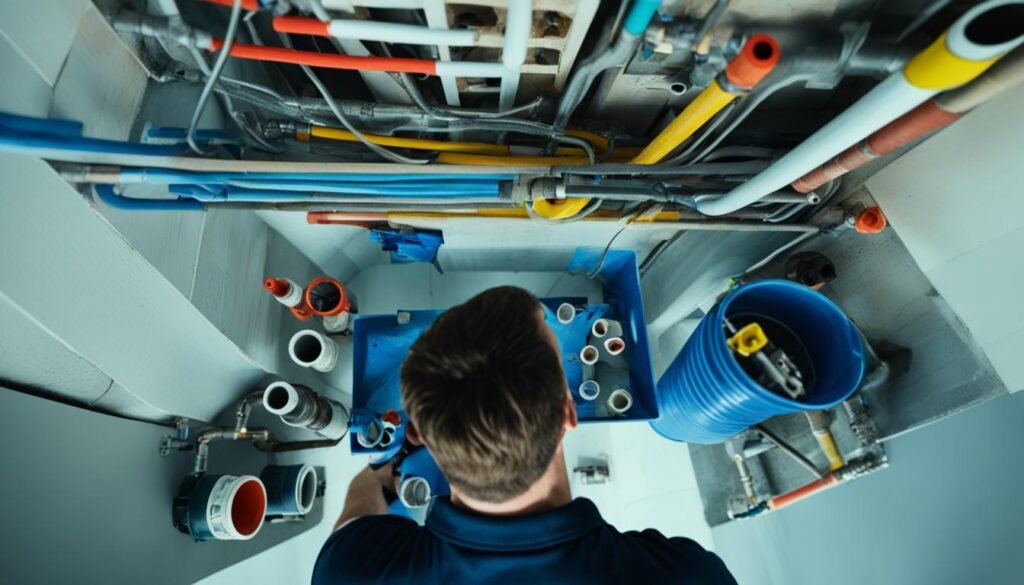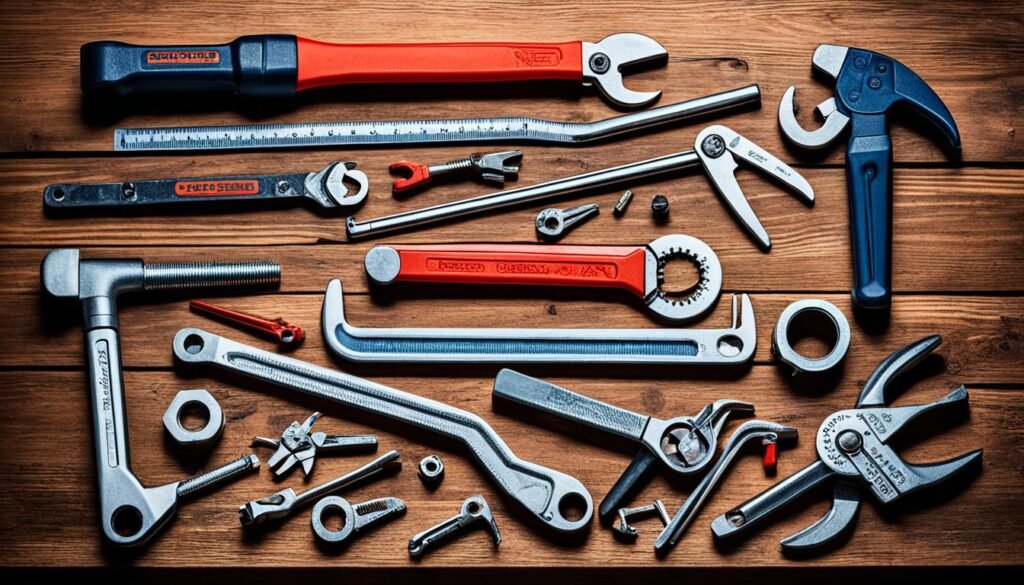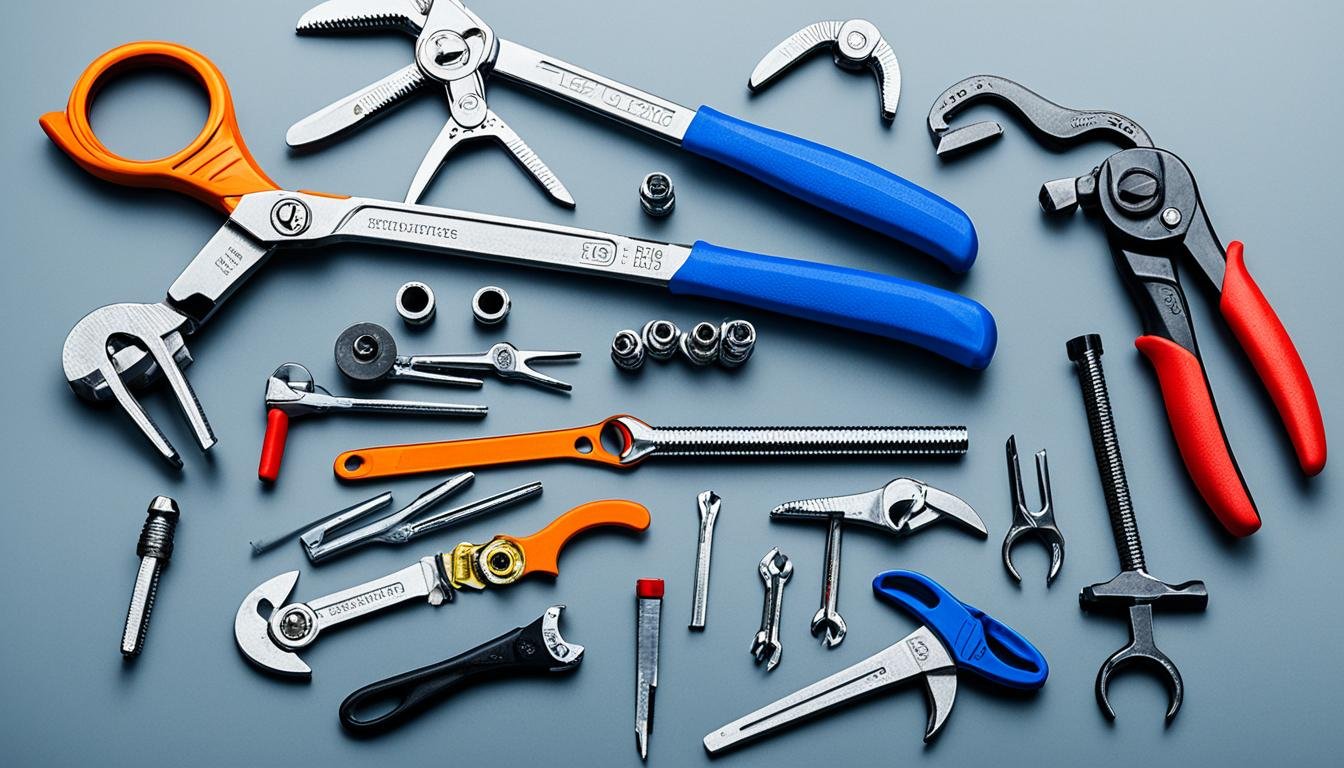Did you know fixing leaks can save a household up to 10% on its water bill? Your plumbing is key, but do you understand it? Knowing how your pipes work and fixing leaks is crucial for new homeowners. It’s important to learn about plumbing from the ground up.
Key Takeaways
- Plumbing systems consist of water supply and drainage components that work together to deliver clean water and remove wastewater.
- Proper water pressure, between 40-45 psi, is crucial for efficient plumbing performance and to avoid damage.
- Fixing leaks can significantly reduce water bills and prevent costly water damage over time.
- Regular maintenance, such as clearing clogs and cleaning fixtures, helps maintain plumbing efficiency and longevity.
- Understanding the location of the main shut-off valve is essential for addressing plumbing emergencies quickly.
Understanding the Plumbing System
Your house’s plumbing is a grand system. It brings in fresh water and removes used water. It relies on the water supply system and the drain-water vent (DWV) system to work well.
Water Supply System
The water supply brings clean water to your house. It might come from a city water or a well water source. The system includes the water meter and shut-off valve.
Your house’s water system might have pipes made of copper, PVC, or galvanized steel. The material affects water pressure and flow.
Drain-Water Vent (DWV) System
The DWV system removes wastewater. It ensures water flows out properly. It includes drains, vents, traps, and cleanouts.
Drains move water from your sinks, showers, and toilets. Vents keep air flowing to stop siphoning. Traps block sewer gas from coming in. Cleanouts help unclog the system.
Knowing about your plumbing helps spot problems. You can do basic care and know when to call for help. Learning about both systems helps keep your plumbing working well for a long time.

| Plumbing System | Description | Key Components |
|---|---|---|
| Water Supply System | Brings clean water into the home | Water meter, shut-off valve, pipes (copper, PVC, galvanized steel) |
| Drain-Water Vent (DWV) System | Removes wastewater from the home | Drains, vents, traps, cleanouts |
Plumbing Basics for Beginners
Being a homeowner means you might need to fix plumbing problems on your own. With the right info, you can do these projects safely and well. Plumbing Basics for Beginners will show you what you need to know for fixing common plumbing issues.
Start by learning about your home’s plumbing system. Know where the water comes in, where it goes out, and how to turn it off. This makes it easier to spot and solve problems.
Plumbing Tools for Beginners
To do plumbing jobs, you need the right tools. Here are a few you can’t do without:
- Pipe wrenches to tighten and loosen pipe fittings
- Basin wrenches for working on faucets and sink fixtures
- Plungers to clear clogged drains
- Drain snakes or augers to remove stubborn blockages
- Teflon tape to create watertight seals on threaded connections
Knowing how and when to use these tools is key. It can turn a hard job into an easy one.
Fixing Common Plumbing Issues
Clogged drains are a big issue for many. Rather than using harsh chemicals, start with a mix of baking soda and vinegar. It’s greener and won’t hurt your pipes.
A running toilet is another problem that wastes water. Fixing it is about adjusting some parts inside. This can stop the water from flowing when it shouldn’t.
Finding and stopping water leaks is very important. They can cause a lot of damage. Watch for signs like noise, wet spots, or stains. Always turn off the water before you start fixing a leak.
Working on plumbing by yourself is a great skill to have. But, some jobs are better left to the experts. If you’re not sure or if the problem seems big, call a pro. They know how to handle tough plumbing issues.

Understanding the basics of plumbing can help you save money and keep your home safe. With the right tools and some knowledge, you can fix a lot of plumbing issues. But, always know when to ask for help.
Maintaining Your Plumbing System
Keeping your plumbing in top shape is key for your home’s health. This includes everything from fixing leaks to preparing your pipes for winter. Doing a little work early can help your plumbing last longer and work better. We’ll look at tips to keep everything running smoothly.
Leak Detection and Prevention
Looking for and stopping leaks is a big part of plumbing care. Even small leaks can waste a lot of water and cause damage. It’s smart to check pipes, toilets, sinks, and appliances every week for leaks. A water leak detector can also be very helpful. It warns you about problems fast, helping to stop bigger issues.
Drain Cleaning and Clog Prevention
Clogged drains are a headache, but you can prevent them. Try using a mix of baking soda and vinegar to kill clogs naturally. It works as well as common chemical cleaners but is better for the planet. If a clog is tough, a drain auger can help.
Water Heater Maintenance
The water heater is key and needs regular care. Make sure to clean out the tank and check the safety valve. These steps help it last longer and work better.
Winterizing Plumbing
Before it gets too cold, prepare your plumbing for winter. This means insulating pipes, turning off outdoor water, and draining systems. It keeps pipes from freezing and causing problems.
Follow these tips to keep your plumbing healthy. This can save you a lot of trouble, money, and time. Remember, you can do some easy fixes yourself. But if things get tough or you need big changes, call a plumber.
Conclusion
Every homeowner should understand their home’s plumbing. You need to know about the water supply, drains, and the right tools. This helps you fix small issues and avoid big repair bills. With a bit of knowledge, you can keep your plumbing working smoothly and prevent costly problems.
It’s important to keep up with plumbing care. Fix leaks right away and use green plumbing products to save money and water. Also, know the rules for safe plumbing and stay away from common DIY mistakes. This will keep your plumbing safe and efficient.
Learning about your plumbing is useful for all homeowners. It puts you in charge of your home’s upkeep and helps you make smart choices about plumbing work. By being proactive, you can enjoy a trouble-free plumbing system in your home for many years.
FAQ
What are the three primary systems that make up a home’s plumbing?
The main systems of a home’s plumbing are water supply, heating, and drainage. Each handles different but important jobs.
How does the drainage system work?
The drainage works using gravity. It moves wastewater out of your home. This happens either to a public system or a septic field.
What are some essential plumbing tools and techniques every DIY-minded homeowner should know?
DIY homeowners should learn about pipe work, finding leaks, and fixing faucets. They should also know how to clean drains. It’s important to understand plumbing rules and staying safe.
Why is proper maintenance important for a home’s plumbing system?
Good upkeep is crucial for your plumbing. It includes caring for the water heater and preparing pipes for winter. This keeps everything running smoothly.
Source Links
- https://homeclimates.com/blog/beginners-guide-to-plumbing
- https://www.orderaplumber.com/blog/2022/april/beginners-guide-to-plumbing/
- https://www.veteranair.com/blog/beginners-guide-home-plumbing/
- https://happyhiller.com/blog/understanding-the-basics-of-plumbing/
- https://www.plumbworld.co.uk/blog/plumbing-basics-learn-about-your-home-plumbing-system
- https://advantageplumbingnow.com/2022/11/10/plumbing-basics/
- https://teamenoch.com/blog/plumbing-basics/
- https://5-starplumbing.com/plumbing-basics-101/
- https://4frontenergy.com/blog/plumbing-basics/
- https://aquariushomeservices.com/blog/plumbing-basics/
- https://www.amica.com/en/resources/home/maintenance/9-preventive-plumbing-tips.html
- http://www.nmffa.org/uploads/4/1/0/7/41075673/a3_19_maintaining_and_repairing_plumbing_systems.pdf
- https://plumbingconcepts.com/plumbing-101-the-ultimate-beginners-guide/
- https://jefftheplumber.com/blog/2023/11/06/understanding-the-basics-a-beginners-guide-to-home-plumbing-systems/
- https://www.rexmont.com/blog/basic-plumbing-guide/

